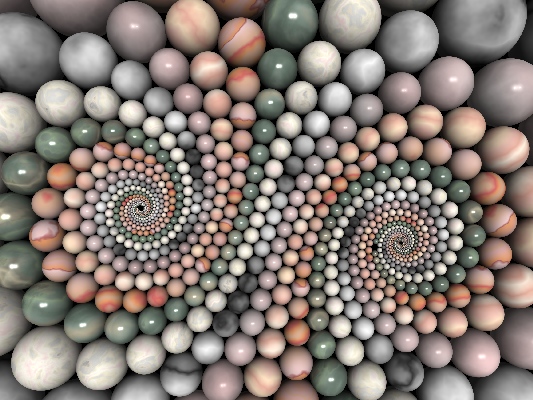
In this article, I invite you to ponder a controversial question: Is technology helpful or hurtful? The verdict depends on our consciousness. The ancient spiritual texts of India tell us that a person’s internal state translates into external action. How someone uses things, for better or worse, is the outer manifestation of a particular inner reality. For example, according to the type of consciousness, a surgeon’s knife in someone’s hand can either heal a man or murder him.
In this way, to understand humanity’s relationship with technology, we should ask: What is the quality of consciousness with which we use technology? Our criterion for judgment is the level of consciousness, rather than the technology in and of itself. Let me invite you, however, to look at the question of good or bad technology in an even more subtle way. You see, by our observing the prevalence of a certain kind of technology, we can deduce the proliferation of a certain type of consciousness. My charge is that the consciousness that predominates throughout the world today is a malignant strain that preoccupies itself with permutations and adaptations of matter rather than with pure consciousness itself.
What relation does consciousness have to science, as we know it today? We will deal with this soon. Meanwhile I would like you to bear in mind one verse from the Bhagavad-gita (2.17): “That which pervades the entire body you should know to be indestructible. No one is able to destroy that imperishable soul.” Here Lord Krishna speaks about consciousness as the energy of the soul, explains that this energy cannot be destroyed, and that the symptom of the soul’s presence is consciousness. Of course, according to the limited constraints that current science has imposed, you may counter, “Well, the soul is strictly a religious entity. There is no empirical proof for it; no technological device has detected it. The idea of the soul sounds sweet, but the notion doesn’t make it in today’s high-tech world of hard data.”
Now we collide head-on with the main complaint of spiritual scientists. What most disturbs spiritually-based thinkers is not technology itself, but the severe limitations of current technology—in other words, the matter-bound focus that recognizes only a narrow spectrum of reality. Such a crippled attempt at technology ignores the most basic essential of our existence: our own consciousness. No doubt, many of you may say, “If you’re talking about religion, well, that is your own personal affair. Any truly educated person knows that spirituality relies upon uniquely personal testimonies of experience, which can never be tested; whereas scientific research is verifiable by everyone–therefore we call it universal.”
Please contemplate some well-known statistics that reveal a spiritual versus material conflict deep within science as practiced in the USA. 1) Between 70-90% of Americans believe in a personal God. 2) 40% of the scientists in America say that they believe in a personal God. Has any scientific evidence—as conventionally conceived—ever pointed to a personal God? But obviously many scientists identify with this conclusion, although their academic discipline provides no conventionally acceptable evidence for such a belief. From the above statistics we may understand that a wide gulf now exists between what educated people actually believe and the knowledge they have accumulated. This gap, unless bridged, will generate increasing tension, both individually and socially.
The Missing Link: Consciousness
According to the standard of Western science, the ancient information about consciousness found in Vedic texts such as the Bhagavad-gita and Srimad Bhagavatam cannot be considered “real knowledge.” Why not? Because it is “religious.” Most current scientific views on consciousness rest upon hidden metaphysical principles, which underlie almost all conventional scientific inquiry. You may be surprised to know that in our morning classes at our temples, we discuss these points. As dedicated spiritual researchers, we wrestle with these issues. Through Bhagavad-gita and Srimad Bhagavatam, we can clearly see their resolution.
Indeed, the mature spiritual practitioner focuses upon the most crucial issues that deeply affect everyone. I ask you, what can be more crucial and profound than your own consciousness? Only by your consciousness are you aware of studies in science, religion, politics, economics, psychology, and so forth. But what evidence does science give you for your own consciousness? Nothing!
There is absolutely no technological device that can directly detect either the presence or the absence of consciousness. (Brain activity, yes; consciousness, no.) Even more embarrassing, scientists don’t know what to measure. There is absolutely no scientific evidence for the existence of consciousness. Does this monumental void expose a problem with consciousness? No, it reveals a huge problem with science as known today.
How do we know we have consciousness? The only direct evidence, although nonscientific according to today’s empirical standards, is an individual’s first-person account of his or her own consciousness. Each individual can say, “I feel I am conscious.” Moreover, each person can talk with someone else and say, “Yes, I also feel I have the subjective experience of consciousness.” The fact that scientifically we can come up with no other evidence means that there is a huge hole in our knowledge.
The International Dictionary of Psychology writes, “Consciousness is a fascinating but illusive phenomenon. It is impossible to specify what it is, what it does or why it evolved. Nothing worth reading has ever been written about it.” Even according to this pre-eminent compendium, nothing scientifically substantiated has ever been written about the most vital and obvious thing about you—your consciousness. Does this mean that everyone should conclude that there is nothing to be said about consciousness? Of course not.
Techno-Pride and Passion
Technology has enthralled the world with well-publicized progress in explaining and manipulating the external and physical world. This fever to interact analytically with matter has overpowered any sympathy for ancient knowledge that explores the inner reality of consciousness. Owing to the modern lack of knowledge about consciousness, scientists over-endeavor in their pursuit of the quantifiable world of matter. The apparent success produces a hubris which blinds their eyes to the value of ancient research into consciousness. In this way so many people think that the ancient Vedic knowledge is just “Hindu granny wisdom” from the old days. (Ironically, these ancient Vedas also contained precise astronomical information that is now universally recognized and accepted by the scientific community.)
Let’s go back to some basic facts: 1) Science does not know how or why consciousness originates. 2) Science cannot detect consciousness in the body at any stage. Sometimes there are debates as to whether the human fetus is conscious. Such debates are as unproductive as debates about consciousness in a full-grown adult. Since no one can detect consciousness in an adult, why argue if a fetus is consciousness? Many scientists mock any acceptance of an afterlife. No evidence whatsoever, they say, shows that consciousness survives death. Thus they divert you from the fact that no evidence proves consciousness is present at any stage of a living body. So let’s be honest and face the truth: whether the body is alive or dead, fetus or full-grown, there are no material scientific means for detecting consciousness.
If you stop and ask yourself why you are reading this article, you will probably come up with an answer that sounds something like: The topic appealed to me. Really? The prevailing scientific doctrine is that your so-called free choice to read this was the result of an ongoing subjective illusion. This mirage made you feel that you exercised “free will” to pick up this edition of 16 Rounds. While the neurochemistry in your brain interacted with the external physical environment in a particular way, concurrently these chemicals in your brain generated a lie that there is such a thing as free will and free choice and this is the only reason you are reading. Supposedly the brain is just interacting with stimulations from the physical environment, and somehow or other, amidst that purely material interaction, an illusion is generated that you are conscious and have free will.
As the French molecular biologist and Nobel laureate Jacques Monod said: “The ancient covenant is in pieces: Man at last knows that he is alone in the unfeeling immensity of the universe, out of which he has emerged only by chance. Neither his destiny nor his duty has been written down.” Although this is the predominant scientific explanation, I am sure that many people reading this article disagree.
For icing on the cake, please cherish the words of the late and great Francis Crick, co-discoverer of DNA structure: “You, your joys and sorrows, your memories and ambitions, your sense of personal identity and free will, are, in fact, no more than the behavior of a vast assembly of nerve-cells.” As Lewis Carroll’s Alice might have phrased it: “You’re nothing but a pack of neurons.”
There is no doubt that technology has made great strides in understanding some things about this world. For example, we know much about many biological processes of the body. But where is the scientific explanation of consciousness? It is the greatest mystery so we decided to ignore it. The fundamental principles of scientific materialism have allowed us to grasp only a certain range of natural phenomena. This is the problem. So, once again I propose that the fault rests not so much with the technology but with the consciousness that uses the technology.
Practitioners of Krishna consciousness study literature about individual transformation and then apply the principles in their own lives. One can observe how the consciousness changes through this process. We note how our transformation matches up with the classic ancient accounts of consciousness transformation. But because we insist on such a narrow focus for science, we ignore these subjective experiences. This dogmatic adherence to materialistic principles of science and technology has crippled scientific research and impoverished our understanding of nature as a living whole.
What we are suggesting is not that we abandon technology; rather, that we expand technology so we can understand ourselves. To achieve this necessary development, we should consider systems of scientific inquiry outside of Western culture. Since consciousness has proven to be so inscrutable by Western scientific methods, perhaps we should humbly admit that Western knowledge-systems would benefit by coupling with ancient Vedic systems of inquiry.
State-Specific Knowledge
The Vedic texts, such as the Bhagavad-gita and Srimad-bhagavatam, present studies of consciousness in highly advanced souls. But the Western scientific mindset discards these investigations because the ordinary scientist cannot walk into a laboratory and readily experience such elevated states of consciousness. True, only sensitized spiritual adepts, steeped in Vedic process, can enter within Vedic research. But does that barrier to entry automatically mean Vedic investigations into consciousness cannot stand as verifiable “universal knowledge”?
Physicists say it takes eight to ten years just to train a recruit to comprehend fundamental reality according to the chimera of quantum mechanics. Not only does the initiate have to accept that the world buzzes with components that are intrinsically unobservable, but also needs to accept the existence of waves and particles that have no single objective reality until an attempt is made to measure them.
The ancient Vedic system of knowledge takes firsthand experience of consciousness seriously. The contemporary bias, however, requires quantifiable data that any certified reductionist or empiricist can verify. We may find that just this very constraint traps our learned folk in a certain kind of cocoon that prevents them from accessing higher knowledge. Contrary to the viewpoint of Western empiricism, the Vedic point of view is that knowledge is state specific. Krishna says, “I am not manifest to everyone—by My own arrangement. According to your state of consciousness, I reveal Myself.” (BG 7:25) Lord Krishna lets us know that perception depends on the person. The qualification of the observer determines what the observer can see.
Knowledge is state specific. According to your state of consciousness, you will be able to understand some things, while other things will remain unknown to you. Therefore, the Vedic system prescribes that if you want to increase the scope of your understanding, you must first refine and purify your own consciousness.
Obviously this principle has not much to do with Western knowledge-processes. “Why drag my personal life into the laboratory?” many contemporary scientists would protest. “I may smoke, drink, and indulge in random sexual connections–that is my own personal affair. But have no doubt–when I walk into the laboratory, I’m ready for work. Suddenly from me will emanate objective, dispassionate analysis.” The Vedic scientists know that according to your lifestyle, your research is already molded because different lifestyles produce different levels of consciousness. Anyone studying physics should immediately recognize this Vedic fundamental because they know that in quantum physics the observer plays a crucial role in what is observed.
Now you might concede, “Look, it could be true what you are saying. There could be a spiritual reality, the soul, the Supreme Soul, and so forth, but how many of us can access this reality?” Krishna consciousness, bhakti-yoga, does require some preparation. The ingrained thinking processes need an overhaul, if the student wants to perceive spiritual phenomenon. The ancient texts say that if you want to understand Brahman, the supreme spiritual reality, then you have to be Brahman, a brahmana. But what does it mean to be a brahmana? Is one considered a brahmana by birth? Absolutely not! Nowhere in the Bhagavad-gita does Krishna say you become a brahmana by birth. No, you must have the qualities.
Suppose, I informed you, “My father is a surgeon; therefore you don’t have to worry about my own qualifications. Because he is my father, you can trust me to operate on you.” Should you expect that automatically, by heredity, the son is an expert in the father’s field of research? Bhagavad-gita says guna and karma: we must see your qualities and activities. Then we can judge whether you are a brahmana or not.
To understand the spiritual reality, we must have a spiritual lifestyle. Then we can adequately participate in scientific discussions of consciousness. As long as you remain trapped in materialistic paradigms, only a narrow band of reality will reveal itself to you. When you are a materialist, it is very easy to focus exclusively on matter, because your tunnel vision acknowledges only material objects, material bodies. When you become purified from material contamination and detached from matter, however, the spiritual reality awaits you. At the beginning of your spiritual studies, that’s all Krishna asks that you do: detach yourself from matter and take up some spiritual processes of purification, so that your spiritual cognition can expand.
Krishna Consciousness and the Material World
Sometimes it is said that religion should clarify the values of life and the personal goal of life, whereas science will give genuine knowledge of reality. But this division proves self-deluding, because naturally what you accept as your reality will determine your goals and your values. If you see reality as just matter, naturally you will be inspired to presume only materialist values and materialistic goals. But if your version of reality sees matter and spirit (consciousness being the indicator of a spiritual energy) then your values and goals can become spiritual.
What about this escape route: “The sacred world is the domain of religion, while the natural world is the domain of science—especially of technology. Leave religion to sort out the sacred world–whatever that is; meanwhile, science will discover the reality.” The Bhagavad-gita, rejects this ploy. Lord Krishna claims both the material and spiritual domains. Aham sarvasya prabhavo: “I am the origin of everything material and spiritual. Everything emanates from Me.” Iti mattva bhajante mam: “What will happen when you know this? You’ll become buddha, wise, and bhava samanvitah, you’ll radiate with transcendental ecstasy.” (BG 10:8)
Therefore, the spiritual scientists, the practitioners of Krishna Consciousness, do not push Krishna out of this material world. True, this material world is very insignificant when compared to the spiritual world; nevertheless, it emanates from Krishna. Let’s connect the material energy to its source. That is real, comprehensive science.
Materialistic science, seeking to control nature, depersonalizes so-called objective phenomena as if such phenomena exist in the mind’s eye independent of any significant subjective coloring. Thus, according to this standard belief, in effect the whole world becomes liberated from personhood and the scourge of subjectivity. Based on this illusion, matter-bound scientists feel secure to dismiss transcendentalists and their teachings. After all, unlike science, they believe, such spiritual knowledge bases itself on only subjective experience.
We have all heard reports, for example, that hundreds of people somewhere observed a statue of the Virgin Mary with tears in her eyes. Whether the reports were true or false, hard-core physicalists would already have made up their mind in advance: “These sightings are just intense subjective visions conjured up by persons so fervently dedicated to their religion that they actually can see a tear in the statue’s eyes. Just witness the deluding power of devotional subjectivity! Pure science never does anything like that—it is dispassionate, free of both bias and subjectivity.” This is the stereotypical way conventional science approaches spiritual experiences and knowledge.
The tragedy is that the conventional scientific elite have rushed to depersonalize the world, because they know little about consciousness. Moreover, they take pride in the now standard matter-bound systems for acquiring knowledge, when actually they lack complete knowledge about the very medium by which awareness comes to us. If you don’t understand the very thing that permits your awareness of the natural world, then do you really understand the natural world you are experiencing? Krishna-consciousness practitioners do not run from this dilemma. We grapple with it daily, in our bhakti laboratory of personal transformation.
A Drop of Humility, Please
The honest researcher will at least make a comparison between the two metaphysical systems—ancient and contemporary. Wouldn’t you agree that even an attempt by the ancients to research consciousness is at least better than the modern approach of almost no attempt at all? The speakers in the Bhagavad-gita and Srimad-Bhagavatam experience different levels of consciousness and openly discuss them. Therefore, yes, we should compliment the Krishna-conscious persons, both past and present–at least they’re trying to cope with the foremost riddle, consciousness.
Otherwise, we can worship at the feet of persons like the late Nobel laureate Francis Crick, of DNA fame. Before his recent demise, he switched to the field of consciousness research, seeing it as the unexplored frontier. But before he began his research, he had already declared, a priori: “There is no doubt whatsoever that consciousness is an emergent principle from a physical brain.”
Now please note that because he was Francis Crick, his words become almost sacred. But what about Gauranga Dasa? Suppose this leading Krishna-conscious practitioner and teacher publicly announces, “There is no doubt that consciousness is the energy of the soul.” Surely many of his former comrades and professors at I.I.T. will respond, “The poor boy, formerly one of us, did have a future as a great scientist, but lamentably he has now become bewildered by unscientific subjective sentiments.”
You see the bias? Francis Crick can expound his religion and be worshipped. But if we say what Krishna says in the Bhagavad-gita–that consciousness is the symptom of the soul and is indestructible, then: “Oh, spare us from this Hindu village folklore!”
I am sorry to say that this arrogance has been an unfortunate by-product of technological advancement. In our greed to proliferate technologically, we have obscured any help that the ancient knowledge of India might give us for illuminating the greatest mystery of human existence. Again, we don’t propose that society throws out science and technology. We simply say that the current processes of research need help from other methods of scientific enquiry, which derive from a different world view.
The Path to Freedom
I would like to urge you to seriously consider the ancient system of spiritual scientific enquiry known as bhakti-yoga. Practitioners of Krishna consciousness daily tackle the deepest questions and illuminate the darkest mysteries. Such spirited investigation and analysis accompanies the chanting of the Hare Krishna mantra. “What is the ideal state of knowledge? How do I explain reality? How do I explain myself?” We think about these things. We experience them. With both our intellect and heart, we are dedicated to the maximum pursuit of spiritual experience. I must say it is indeed quite pleasurable dealing with the real world—the bhakti world.
According to the current scientific myth, there is nothing but matter; everything is physical. I know that some of you are completely lost in the dream that only matter exists, nothing else. To you, I ask: If everything is matter, then why should anything matter to you? Is it okay to push someone out of the window of a tall building?. After all, that person is just a conglomeration of matter, nothing more—right? The person’s matter would merge with the pavement matter down below—what’s the problem? Of course, you won’t accept this reasoning, because intuitively—although not scientifically–you know something else exists. Now, discovering what this “something else” is takes time to research, understand, and experience. A Krishna-conscious life is an exciting, fascinating pursuit. Refining the consciousness so that we become free of material influence is a wonderful thing. To be able to control the mind and senses, to become immune to the demands of consumerism—this is the beginning of real freedom. Through bhakti-yoga, you become liberated from lust, anger and greed. Otherwise, as long as passions blind us, we cannot perceive properly.
I am sure you’ve all had the experience of misplacing something while worries occupy your mind. Then, when you searched your room thoroughly, because you were still mentally preoccupied with anxiety, you could not see the missing thing—even though it was right before your eyes. Everyone has experienced this waste of valuable time. Similarly, when the passions of consumerism and sensuality invade our mind, we can’t see the indicators of spiritual reality–for example, consciousness–despite their standing under our nose.
The sublime state of Krishna consciousness is more than worthy of your effort. Here is a goal that will take the best you have. As stated in Bhagavad-gita (6:22): “In the stage of perfection called trance, or samadhi, one’s mind is completely restrained from material mental activities by practice of yoga. This perfection is characterized by one’s ability to see the self by the pure mind and to relish and rejoice in the self. In that joyous state, one is situated in boundless transcendental happiness, realized through transcendental senses. Established thus, one never departs from the truth, and upon gaining this he thinks there is no greater gain. Being situated in such a position, one is never shaken, even in the midst of greatest difficulty. This indeed is actual freedom from all miseries arising from material contact.”
Even at the beginning of your ascent to this purified state of existence, you can start to understand what reality is. I know that some of you won’t be able to rest until you delve into the mysteries of spiritual science–we are happy for that. Others of you will say, “Yes, yes, what Swami is saying is probably true; nevertheless, I have to live my life. We live in a practical world, and so my sails are already set on that course.” But I ask you, how practical is a world that does not understand itself, a world that cannot understand the very medium by which it perceives everything? That is very impractical!
How can I become qualified to research the spiritual reality? What is the lifestyle of an advanced transcendentalist? Who is qualified to see this world as consisting of matter, spirit, and the controller of both? If you can master this kind of scientific inquiry, then indeed you will have something worthwhile to pass on to your children.






